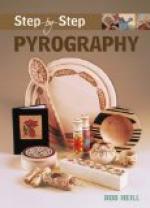But the donkey was not to get his holiday so easily. There came a shout from the forest, and a boy on a brown moor pony went racing off after the truant beast, while a lady and a young girl looked on laughing. It was a very pretty chase, but at last Roger came back in triumph and tethered the donkey, repentant and lop-eared, to a wind-warped oak.
“O Mother Izan!” cried Eleanor, “we’ve found a great parcel of herbs. I never saw this before, but mother thinks it’s what they called polygonec in France and used for bruises and wounds.”
The old woman seized eagerly on the plant. It was a long curved stalk with a knotted root and oval leaves almost concealing the narrow greenish bells that hung from the joints of the stem. “Aye,” she said, “that’s Solomon’s Seal, and ’tis master good for ointment. The women,” she added dryly, “mostly comes for it after their men ha’ made holiday.”
Eleanor was already off her pony, and Roger followed her. “We’ll get you all you want, Mother Izan,” she called back; “there’s ever so much of it up here among the rocks.”
“I should like to know,” queried Roger as they pulled and pried at the queer twisted roots, “why they call this Solomon’s Seal. I don’t believe Solomon ever came here.”
“Maybe it was because he was so wise,” said Eleanor sagely. “Mother said it was good to seal wounds. We’ll ask David.”
In those days a knowledge of herbs and medicines was part of a lady’s education. Physicians were few, and in remote places the ladies of the castle were called upon not only to nurse but to prescribe for cases of accident, fever, wounds or pestilence. Rarely did a week go by without Lady Philippa being consulted about some illness among her husband’s people. She had begun to teach Eleanor the use of herbs, especially the nature of those to be found in the neighborhood, and here Mother Izan was of great service. In her younger days she had ranged the country for miles in every direction, in search of healing plants, and she knew what grew in every swamp, glen, meadow and thicket.
“Mother Izan must have been uncommonly anxious to get that Solomon’s Seal,” said Roger as they rode home in the purple dusk. “I believe Howel has been beating Gwillym again.”
Almost as well-informed as Mother Izan was David Saumond, the stone-mason, who was rebuilding the village church. He had come to the castle one day with news of Sir Stephen Giffard, Eleanor’s uncle, who had been a prisoner among the infidels but had now been ransomed and was on his way home. Finding that David understood his business, the lord and lady of the castle had decided to give into his hands the work to be done on the church. Masons were scarce in England at that time, and most of those who had skill were at work on half-built cathedrals. David was a wise and thorough builder, but he had the reputation of being rather crotchety. Sir Walter Giffard suspected that this was due to his absolute honesty. He would rather pick up a job here and there which he could do as it should be done, than to have steady employment where scamped building was winked at. This suited the knight very well. He wanted a man whom he need not watch.




